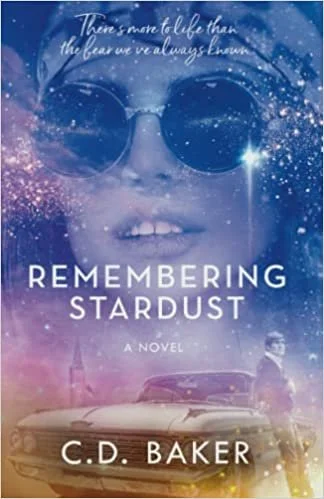Remembering Stardust
I had a hard time getting through this book and an even harder time writing this review. I know how impactful reviews can be, so I rarely write them—especially when they’re negative—and I try my best to keep them detailed and professional instead of just listing everything I hated and moving on.
Let me begin by saying I typically base my rating on three aspects; the Message (how well Christianity was represented and included in the story), the Story/Plot, and the Writing/Editing.
I will say that the Writing wasn’t bad. It wasn’t my favorite and certainly could have included more character development and descriptive details, but it wasn’t bad writing at all. The book wasn’t formatted very well—dialogue was lumped together in paragraphs so sometimes it was difficult to tell who was speaking and to whom. But altogether, that part of the book was not disappointing.
The Plot itself was lacking, in the sense that there wasn’t one. The whole book read like a series of random events, kept together by the dates at the beginning of each chapter. There wasn’t really a point to the story, the events that unfolded never really came together to form a bigger picture. I kept waiting around for things to make sense, for the pieces to click together, but they never did. The book was just a story about the everyday happenings of an eighteen-year-old. That’s it.
And suddenly it was over.
It ended in the middle of the characters going out to a parade, even though there had been tension and build-up about the event being the ‘biggest thing Oliver had ever done.’ We didn’t get to see him do it, so I’m wondering what was the point? Unless this is book one in a series, there was a lot left unsaid and never resolved.
Like Oliver’s dreams and visions—What does Mego mean? Who is Vilo? And what did those encounters mean to Oliver?
It was like he woke up one day and stopped having the dreams. Bam. Problem solved. Book is over.
My biggest disappointment came from the Message. This is such an important part of the story because, being Christian fiction, the inclusion of faith tends to be the foundation of the book. But there was something off about this from the very start.
This book was presented to me as Christian fiction, but the more I read, the more I felt like maybe this was a secular book about Christianity instead.
There was intense vulgar language throughout the book, which doesn’t mean the work isn’t Christian but is certainly something I don’t like to see in faith-based fiction—or any fiction to be honest. I’ve never really believed foul language to be a necessary component in books. You are an author… If you can’t find any other way for your characters to express themselves, especially in a Christian book, then maybe writing isn’t the best career choice. But that’s just a personal pet peeve. Plus, the fact that our characters were not Christians themselves, so I wasn’t surprised to see unsavory people behaving in unsavory ways. Real life is not squeaky clean and bright and beautiful, I cannot fault an author for making their book realistic in the sense that he didn’t sugarcoat his story for sensitive readers.
So I let it slide and surged onward.
As a Christian myself, I was looking forward to Oliver’s journey to salvation as he maneuvered his way through the struggles of life as a teenager in a small town during the tumultuous and politically charged mid-60’s of America.
Oliver has a difficult life, experiencing the death of his mother at a young age, not getting along with his stepmother, and constantly being judged and scrutinized by his overbearing father. His trouble only increases when his questions, interests, and curiosities begin to set him apart in the congregation of local church, Wheatley Bible.
This is where the Message of the book comes in—Oliver is a young man who was raised in the church but never quite accepted Christ for himself. He simply believed because he was told to. He went to church because he had to. But now that he’s able to think on his own, things don’t add up to him. Especially when he’s faced with the small-minded people of Wheatley Bible.
The congregation of WB is just like any other hateful church disguised as Christianity. They are the sorts who believe anything that makes you smile is a sin and if you’re caught doing it, not only are you going straight to hell, but your whole family will suffer until you publicly confess and pay retribution for your wicked act of wearing makeup or going out dancing. *sighs*
To the author’s credit, I related to Oliver on a personal level during these parts of the story. As a Christian who enjoys goth clothes and Christian heavy metal music, I have faced my fair share of bullies who have criticized me, told me I was going to hell, and have made me feel worthless—all while claiming their nasty words were done in the love of Christ Jesus. I have been in Oliver’s place. I have stood out in my congregation and have been brutally put down because of it.
I deeply understand the Message of this book being Love. Far too many Christians do not practice what they preach. We have forgotten the scripture, Treat others the way you want to be treated, and that was never more prevalent in this book through the hateful, nasty church folk of Wheatley Bible.
Oliver takes a journey in discovering his own faith since his church and even his own pastor all clearly behave in a way that doesn’t match the loving kindness of the Savior they claim to serve. I certainly agreed with Oliver’s desire to branch out and looked forward to him getting to know God for himself. But that never really happened.
This is where the story changed.
Oliver’s journey to salvation isn’t really that at all. With all his questions, struggles, and misunderstandings, he never takes anything to God. We never see him praying, never see him reading his Bible. He never actively seeks the Truth. On the few occasions where he finds himself able to ask questions to the people around him, Oliver is met with a brick wall. The Christian characters in this book just stare dumbly at him, unable to offer any response to his confusion. And the people who do give him some wisdom and guidance aren’t even Christian. As if to say, Believers don’t understand the Bible they read.
That happened over and over throughout the story, to the point where I began to wonder if this book was a work of Christian fiction or merely fiction written in mockery of Christianity.
All in all, I would say Baker did not do a good job at defending Christianity. His representation and portrayal of the faith was handled in a manner where I’m not even sure if he himself is Christian. I’m not even sure what the point of this book was, because in the end, Oliver was pretty much in the same place as when the book started.
His ‘coming to salvation’ happened randomly. One day he was wondering if he even believed in God, and literally the next chapter he was on his knees with tears in his eyes proclaiming that he suddenly understood he was God’s Beloved. It happened in the middle of the night, almost as a sudden, unexpected awakening.
And from then on, Oliver continues doing what he’s always done. He smokes weed, he lives with his girlfriend, and he curses throughout the entire novel. From beginning to end. The only thing that perhaps changes is that he sees Love in everyone. And knows that Love is the greatest thing in the universe.
That was pretty much the sum of his faith. He never calls himself a Christian or a Believer, just says that he lives in Love and all will be well. None of the other characters ever get saved either, everyone just accepts Love.
I have no idea what the point or purpose of this book was. Maybe I missed the mark. Maybe it just wasn’t for me. But there are certainly things I liked, just a lot more that I didn’t like. I don’t agree with the criticisms of the real-life preachers that were mentioned in the book, I don’t agree with most of the characters’ political views, and I certainly don’t agree with the concepts of Heaven and Hell that were brought into the story.
They were so far out, and introduced through characters who never called themselves Christians and referred to Jesus as ‘The Cosmic Christ,’ that I had to wonder if the characters were misguided or if Baker himself has a skewed understanding of the Bible.
The worst part is that these ideals and concepts were never fully explained nor backed up by Scripture. The author simply has his characters make wild claims about the existence of Heaven and Hell and then says, read your Bible with Love in your heart and you’ll see the truth.
I am not offended when I read Christian books and find things that I disagree with. There are millions of Christians around the world, this means millions of different opinions and interpretations of the Word. But if you are going to make the sort of claims I saw in this book, they need to be backed up by some sort of detail or explanation. Otherwise, you’ll just leave readers scratching their heads—as if those parts were included for the very purpose of stirring up confusion or planting seeds of controversy.
All in all, this book just wasn’t for me. I tried to like it. I made it through to the end. But I didn’t enjoy it and I’m not sure I would even recommend this to other Christian readers. There was incredibly strong, vulgar language throughout the book, and in the end, I’m not exactly sure what the Message of this novel was beyond exposing how mean and nasty some Christians can truly be.
If you’re looking for something that is deeply philosophical, this may be for you. But as a genuine Christian story about salvation, it came up very short.
Remembering Stardust is available on Amazon today. Click here to start reading now.

